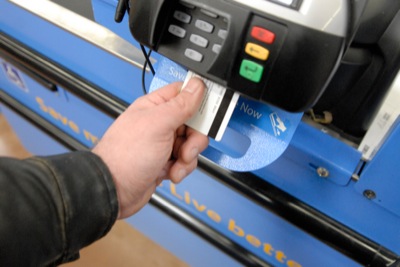Saturday, December 12th, 2015
Businesses grapple with card change
New technology designed to protect public from fraud
By Jesse P. Pollack

Photo by Jesse P. Pollack/The Daily Standard
Area business owners are still largely hesitant to switch to the new smart-card technology. According to new card provider guidelines, business owners are liable for fraud expenses if they do not purchase the new terminals.
Area business owners are struggling to switch from conventional credit and debit card systems to the new smart-card technology.
The new payment cards, also known as "EMV" (Europay, MasterCard and Visa), feature an embedded microchip in addition to the familiar magnetic strip. Users pay by "dipping" their cards into a slot in the new EMV terminals. With the card in the slot, consumers complete the purchase with a signature or by entering a four-digit personal identification number.
According to card providers, the additional steps are designed to protect consumers from fraud.
In 2013, hackers stole the personal and credit card data of roughly 40 million Target customers, leading credit card companies to adopt the EMV technology this year.
"Consumers will, in most cases, receive a letter from their bank or credit card company letting them know their new card is on the way," Sandra Guile of the Cincinnati Better Business Bureau told the newspaper.
The new cards are easily recognizable due to the microchip on the front of the card, she said.
"Once the consumer activates their new EMV card, their old card will automatically deactivate," Guile said. "After that happens, one should immediately shred their old card."
The new cards will not completely eliminate fraud but the new technology should deter would-be criminals, she said.
However, Guile warned that criminals have already begun to adapt.
"Scammers have been sending emails asking consumers to 'confirm their information' for a new card by handing over their PIN number, bank account number and so on," she told the newspaper. "Just like with the IRS scams, your credit card company or bank will never call or email you asking for information. They will send a letter."
According to the Smart Card Alliance, a nonprofit informational group, nearly 120 million Americans had received an EMV chip card by September - and that number is expected to rise to nearly 500 million by the end of December.
The deadline for merchants to switch to the new technology was Oct. 1. After that date, businesses, rather than card issuers, became liable for EMV card fraud under terms set by card providers.
Mercer and Auglaize county businesses are still adapting.
"I'm not preparing for the transition at all," Kim Nation of Celina's Brew Nation said. "Honestly, I don't know what to do. I use a point of sale system, and I'm assuming my credit card company will send me everything I need."
St. Marys Hobby Center owner Larry Kramer also feels left in the dark.
"I haven't been contacted by anyone, let alone my credit card company," Kramer said. "The first I heard of this was on the news. A lot of my friends who are small-business owners didn't know about this until I told them. It's scary for a little guy like me who doesn't know much.
"A different credit card company tried to get me to sign up with them, and told me a new terminal would cost $550," Kramer said. "That would take years for a small-business owner like me to pay off."
Other business owners are holding out to gauge consumer response.
"We're waiting to see what the demand is going to be like," said J.T. Irmscher, owner of Celina's CJ's Highmarks restaurant. "We're talking with our food suppliers to see what other restaurants are doing. We already have a secure payment system in place, so I'm not terribly concerned with the risk of fraud."
EMV card holders can still use the older terminals.
Local business owners who already use the new technology said they enjoy the benefits.
"I have a fantastic support system with my credit card company," Cathi Hall, owner of New Bremen's Topsy Turvy Toys, said. "Any time I need something, I just call them up and they're there to help me instead of transferring me to overseas tech support."
According to Hall, there are some pros and cons to the new system, but she said the positives far outweigh the negatives.
"I've seen a 15-second slowdown in transaction processing, but I've also seen a 3 percent decrease in the store's bills," she said. "Training my part-time employees has been somewhat costly, but my customers now feel more secure. My best advice for other small businesses is to get to know your credit card processor."
Angie Topp, owner of New Bremen's Cornerstone Shop, agreed.
"We got a free terminal by switching credit card processors," Topp said. "The Auglaize County Chamber of Commerce was very helpful."
However, Pam Buschur, executive director of the Mercer County Chamber of Commerce, said her organization is not sharing southwestern Auglaize County's success.
"We went to our credit card processor and they told us they are so backed up right now that they would have to get back to us," Buschur said. "That was over a month ago."
Both Borneman and Buschur encouraged concerned business owners to contact their credit card processors for additional information.


